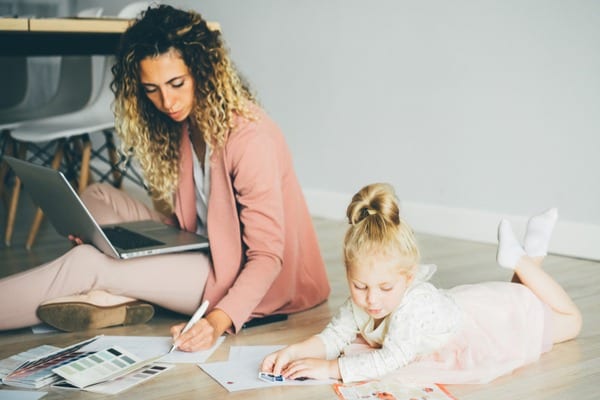It’s not hard to spot the symptoms of this particular parental pandemic.
It starts when a child is still in utero with the downloading of Baby Bach and a strange compulsion to put headphones over your (or your partner’s) pregnant belly. Other symptoms may include pounding the pavement for days on end to ensure your future offspring is on all the “right” waiting lists for the “best” preschool or childcare.
Shortly after the birth of a child, symptoms can grow in intensity with a compulsion to buy exclusively organic groceries and spend countless hours making and freezing mush.
As the child’s first birthday approaches, you might find yourself spending countless hours on Pinterest researching themes and making several trips to the craft shop before a kind-hearted, more weathered parent suggests you, “step away from the glue gun”.
You vow you’ll “never use television as a babysitter”.
Then, before you know it, you reach fevered pitch and find yourself hiring someone to sit your child’s college entrance exams. You only wake from your fevered intensive parenting dream when the AFP comes knocking on your door as part of some kind of “Operation Varsity Blues”.
I am, or course, joking. Sort of.
But given our generation of parents has been so conditioned to believe our children’s every future happiness rests on our shoulders — all the more if you’re the mum – it does beg the question: how will we cope with a prolonged period of self-isolation with our offspring?
The answer: badly…unless we give ourselves, and our kids, a break.
Confession: I took to this whole home-schooling/ quarantine malarkey with the same intensity I do most things. I did research. I printed out a timetable. I held a family meeting and scheduled every moment of the day.
We were going to bake our way through this pandemic. We were going to go on a virtual tour of the Guggenheim. (That was, by the way, a total disaster). We would read the classics.
I shared photos with my equally intense, overachieving pals in our group chat. Look at this letterbox my son and I crafted, said one. Check out this rollercoaster Lego challenge my daughter made, said another. (Okay, that was me).
Then, just before I fully assumed the persona of an apocalyptic June Cleaver, I thought to myself, “what are we doing?” This is not sustainable.
It is also, quite frankly, obnoxious and out of touch. No one wants to be Ivanka Trump chirpily banging on about the tents she is building in her living room while many families are coping with sudden unemployment and doctors are making morally injurious decisions about access to life saving healthcare.
Let’s be honest, our generation of intensive parents, particularly the privileged, middle class ones (present company included), have been on the wrong path for some time now. It’s time for a reappraisal. And that might prove to be a positive, lasting legacy to emerge from this pandemic.
While the 1980’s gave rise to “helicopter parenting” as that generation feared for their children’s safety in an era when “stranger danger” became a common refrain, by the 1990’s we had “intensive parenting”, the notion that it is a parent, particularly a mother’s, responsibility to “cultivate” their children. Every moment is a “teachable” moment. Every moment of togetherness, particularly for guilt-ridden working mothers, is — or should be — “quality time”.
According to time use data analysed by Melissa Milkie at the University of Toronto, working mothers spend as much time doing hands on activities with their children as stay at home mothers did in the 1970’s.
Intensive parenting is now the norm. Most parents, 75 percent, rate intensive parenting superior to the “natural growth” parenting style, according to Cornell University’s Patrick Ishizuka, who conducted a study of 3,600 parents across different socioeconomic backgrounds.
Warnings mounted, culminating in a piece in the New York Times last year suggesting that “intensive” parents are now morphing into “snow plow” parents intent on removing every possible obstacle from their child’s path.
Madeline Levine, a psychologist and author of “Teach Your Children Well: Why Values and Coping Skills Matter More Than Grades, Trophies or ‘Fat Envelopes’,” told the NYT that she had seen numerous troubling examples in her practice of children who had never learned to do things for themselves, including one child who came home from college because she didn’t like to eat sauce. Her whole life her parents had helped her avoid sauce.
Yet we have not paused for thought. Until now. This fever – this pandemic of intensive parenting — might finally break.
Coronavirus will change everything. We cannot shield our children from its impacts, however much we might like to. The pandemic and its impacts will profoundly change them — and us as parents.
What’s more, intensive parenting is clearly a gendered issue. It essentially raised the bar for mothering at precisely the same time women entered the workforce in large numbers, because too often when we say “parent” we still mean “mum” – another good reason to expedite its end.
Ironically, just as we are forced by circumstances into closer quarters with our children and almost constant togetherness, perhaps we will finally learn, or rediscover, the art of leaving them to their own devices. It’s for their own good… and ours.
Kristine Ziwica is a regular contributor. She tweets @KZiwica


